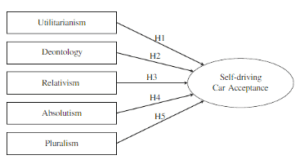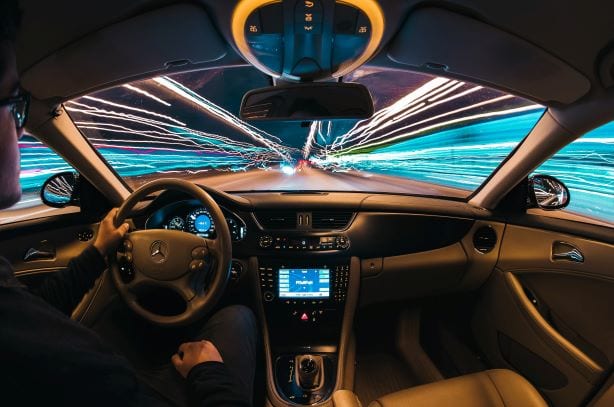Introduction of Self-driving cars
Self-driving cars are autonomous vehicles that are capable of sensing the environment and moving safely. Self-driving cars have sensors for perceiving the surroundings like radar, GPS, lidar, and measurement units. It carries advanced technology with sensors and it also identifies the navigation paths. Self-driving cars are safer than human drivers and self-driving cars are attentive and braking system capabilities use to full in the accident scene. Artificial intelligence made the leap steps towards the practical application of different domains that include intelligent transportation. Self-driving cars are the game-changer. The promise of cars comes with a lot of significant advantages for society and for every individual. Human errors are the causes of vehicle crashes. Self-driving cars bear the promise to reduce accidents through taking human factors. The ethics program in the self-driving cars that are on the high interest and impact of the ethic on acceptance of these cars. In the scope of the unavoidable accidents, a question post in the study, what is the effect of different ethical frameworks that govern autonomous car decision-making on the acceptance?
Figuring out how to make an ethical self-driving car is the thorniest challenge in artificial intelligence. Acceptance of this autonomous machine is the major issue that decides the success. Research devoted to qualitative aspects to pertain to the challenges and benefits. Some research also focused on the explicit ethics of cars and the impact on acceptance. Self-driving motors reveal that moral choices are not universal.
The proposal in this mechanical assignment help is on ethics to design self-driving cars to balance the safety of other pedestrians with the interests of the car’s passengers. The safety issue is very necessary not only for self-driving cars but also for the other cars on the road. The ethical thought about self-driving motors focused on the tragic dilemmas such as hypotheticals by which a car decides to run over a group of schoolchildren and plunge off the cliff by killing its occupants. Self-driving cars make ethical judgments as to when the driver slams on the brakes for avoiding hitting pedestrians by crossing the road illegally.
Ethical framework
Ethics is the branch of philosophy and multiple ethical frameworks are proposed in this study. The ethical frameworks represented as Deontology, Utilitarianism, Pluralism, and Absolutism.
It is the normative ethical framework that considers the best action which maximizes the function through considering negative and positive choices to pertain to the decision. The introduction of the function calculates pleasure and pain that referred to hedonic calculus and guide the decision-making. In this decision take to prevent the function and make action plans that are good to provide safety of the cars.
Deontology is the ethical framework that considers the rules which have absolute quality. It rejects that matters are consequences of the action and focus on what matters a lot. Deontology criticized as prioritizes the right over a good. The programs that crash the algorithms of the self-driving cars are usually based on the deontological system to justify the criminal cases (Nees, 2016).
Ethical relativism is the meta-ethical framework that argued the values, approaches, and norms. It emerges that there is a range of the practice which consider morally acceptable in societies. In the framework of the study, it is proposed that the practices of societies over the issue also judged by moral standards. Ethical relativism also argues that ethics are bound to culture and time that lead to the acceptance of the practices and values. Ethical relativism brings the issues of the differences between the moral aspects which depend on time and culture (Karnouskos, 2018).
The ethical absolutist knows moral rules, practices, and beliefs. Ethical pluralism argues the universal values that consider the single set that interpreted the practices and rules. It goes beyond western tradition and it appears to spread the approach in the ethical differences to utilize the global issues.

The ethical framework has an impact on the acceptance of self-driving cars. There are safety issues of self-driving cars and causes accidents where death and life decision made by it. Many satellite issues are present like if people can trust self0driing cars to make a decision and if cars make a good decision then human drivers actually. Mandatory ethics should be enforced on self-driving cars than individual ethics. Machine-related aspects are the key issues with autonomous cars as there is a need for integrating the ethics in decision-making algorithms of autonomous cars. This is challenging in death and life dilemmas and experimental ethics impact the acceptance of self-driving cars and cause risks and issues for the users (Xu, Chen, Shi, & Zhan, 2020).
Discussion
The manufactures of modern autonomous cars do not address any key issues pertaining to the ethical aspects of the automated decision-making techniques of cars with some initial efforts in the research community. It makes the link between the ethical framework and the acceptance of the self-driving car. The safety issues of cars include:
- Self-driving cars getting confused by the unexpected situations
- Autonomous cars security from hackers.
- Difficulty in interacting with human-driven cars.
- System security from the hackers.
People are accepting self-driving cars under the idealized conditions than the realistic scenarios at the initial deployment of technology. Self-driving motors reduce the traffic on the roads and offer safety. The maps of self-driving cars are difficult to create and sometimes it creates issues and causes safety issues. Self-driving cars require complex social interactions that are tough for the robots. The sensors and trackers can be affected by the bad weather. The manufactures need to go through the ethical issues of the self-driving car. The accidents risks are possible in these types of cars. The security risks of hacking are dangerous as someone can trace the track to hack the vehicle. Automatic cars can easily hack by hackers so their privacy and security are very important.
The question that comes; what needs to be done if people can’t find the satisfactory ethical system obeyed by self-driving cars? People should avoid the use the self-driving motors if it doesn’t satisfy them. The developers are verifying the issues and trying to remove the issues and forming an ethical system of self-driving cars. If it seems to be dangerous and causes serious damage and has many risks, then it should be banned before the makers find the accurate solution to overcome the problems of manufacturing self-driving cars. They need to make the right action plan by using ethical frameworks.
Conclusion
Self-driving cars are expected to be on the streets and make decisions in critical situations which involve the death and life of people. The decision-making processes of machine-driven have an ethical dimension that is not investigated to impact cars’ acceptance. The ethical framework impacts the proposed data to overcome the issues. The issues of self-driving car programming the ethical issues. Self-driving cars are not allowed to be on roads until the research makes the possible ethical solution. The ethical framework investigated in the study to have the effect on the self-driving car acceptance implies the action for involved stakeholders to decide the factor of success or failure of the self-driving cars.
References
Karnouskos, S. (2018). Self-Driving Car Acceptance and the Role of Ethics. IEEE Transactions on Engineering Management .
Nees, M. (2016). Acceptance of Self-driving Motors: An Examination of Idealized versus Realistic Portrayals with a Self- driving Car Acceptance Scale.
Xu, G., Chen, Y., Shi, Y., & Zhan, F. (2020). The Determinants behind the Acceptance of Autonomous Vehicles: A Systematic Review. Sustainability.


